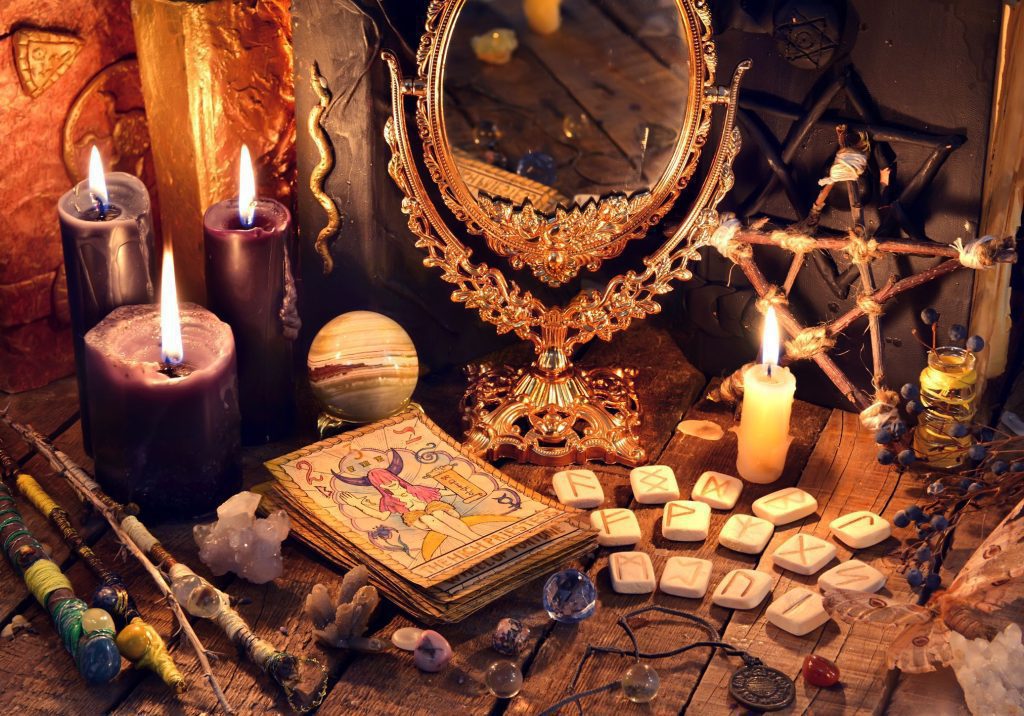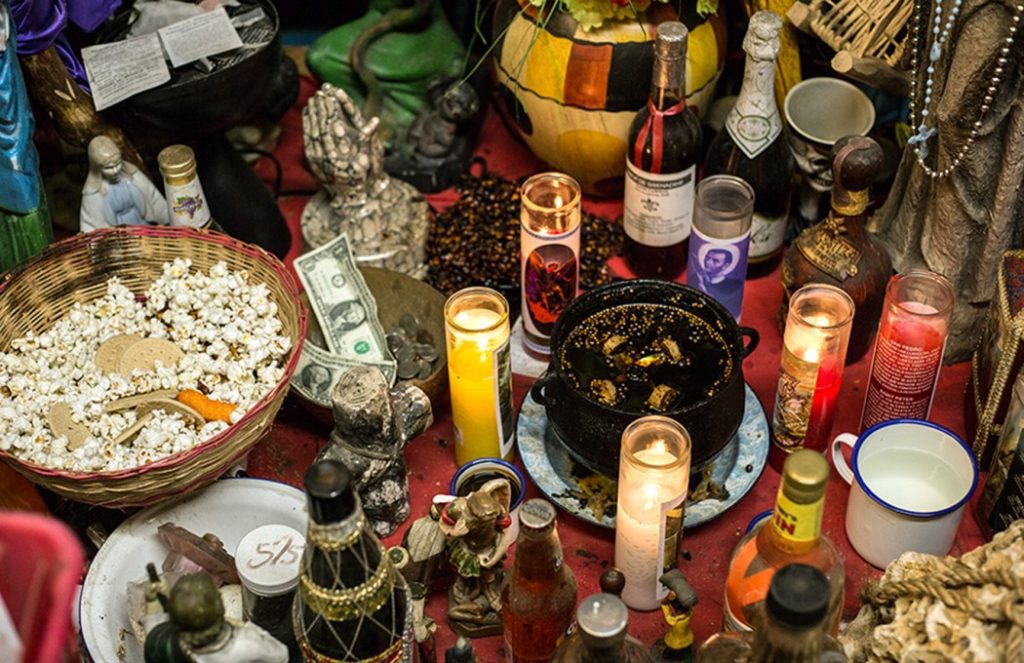Money rituals are a common practice in witchcraft, and they involve using spells, incantations, and other magical practices to attract wealth and financial abundance. While many people may view such rituals as mere superstition, there are those who firmly believe in the power of these practices and have used them to achieve financial success.
Although widely regarded with skepticism, money rituals have been ingrained in various cultures and folklore, raising questions about their true nature and impact on society. In this article, we delve into the intriguing realm of money rituals in witchcraft, exploring their historical and cultural aspects, the most common spells found in different cultures, and the potential psychological effects that believers may experience as a result of their beliefs.
What is Money Magic?
Money magic is the mystical, spiritual, and energetic practice of attracting wealth, abundance, and financial prosperity using intention, rituals, mindset shifts, and energy work. At its core, money magic is about transforming one’s relationship with money — seeing money not as just paper or currency, but as an energetic force that flows through life. Practitioners of the Magic of Money believe that thoughts, words, emotions, and rituals can influence this flow and magnetize wealth into one’s life.
In the world of the Magic of Money, money is seen as energy — a tool for creation and freedom rather than just survival. Money magic practices often include affirmations, visualization, candle rituals, prosperity altars, spellwork, and spiritual alignment to dissolve limiting beliefs around money and unlock financial success.
Understanding Money Rituals in Witchcraft
This requires delving into the intricate web of cultural beliefs, historical contexts, and the underlying psychological factors that drive individuals to seek mystical means of gaining wealth.
1-Cultural Beliefs
Understanding cultural beliefs is crucial in grasping the motivations and reasoning behind the adherence to this type of rituals in different cultures. Here are some key aspects of cultural beliefs in these rituals:
- Ancestral Connections: In some cultures, money rituals are tied to beliefs in ancestral spirits or deities. Practitioners may believe that their deceased ancestors hold influence over their financial well-being and can bestow blessings or prosperity from the spirit world. Rituals, offerings, and sacrifices are often made to honor and appease these ancestors, seeking their favor in matters of wealth and abundance.
- Deities and Spirits of Prosperity: Certain cultures have specific deities or spirits associated with prosperity and wealth. People may perform rituals and offerings to these divine beings, believing that doing so will attract financial blessings. These deities or spirits are often revered as guardians of material success and are called upon during times of financial hardship or when seeking financial growth.
- Symbolism and Sacred Objects: Money rituals often involve the use of symbolic objects believed to possess mystical powers. These objects can include gemstones, coins, herbs, and talismans, among others. Each object may hold specific properties or energies associated with wealth, and their use is central to money rituals.
- Ritualistic Practices: Money rituals often have a structured and ritualistic nature. Specific actions, prayers, chants, or spells are performed in a prescribed manner to align with spiritual beliefs and draw forth desired financial outcomes. Rituals may vary from simple private ceremonies to more elaborate community events, depending on the cultural context.
- Community and Cultural Identity: Money rituals can also serve as a way to reinforce cultural identity and community cohesion. These practices are often passed down through generations and become integral parts of a culture’s heritage and tradition. Engaging in money rituals can strengthen social bonds and foster a shared sense of purpose and belief among community members.
- Hope and Empowerment: Cultural beliefs in money rituals provide hope and a sense of empowerment to those who practice them. Believers may feel that they have some control over their financial destiny through these rituals, and this belief can drive them to take positive actions towards their financial goals.
- Adapting to Modern Times: Cultural beliefs in money rituals have adapted to modern times. In some cases, traditional rituals have been merged with contemporary practices or modified to fit the changing social and economic landscape.

2-Historical Contexts
The historical contexts surrounding money rituals in witchcraft provide valuable insights into how these practices emerged, evolved, and adapted over time. By understanding the historical origins of money rituals, we can better comprehend their cultural significance and the reasons why they persist in various societies
- Ancient Origins: Money rituals have ancient roots that date back thousands of years. In many early societies, including those in ancient Egypt, Mesopotamia, and various indigenous cultures, rituals and offerings were made to appease gods or spirits associated with wealth and prosperity. These early rituals often involved sacrifices or offerings of valuables and food to gain the favor of these supernatural beings.
- Connection to Agricultural and Economic Cycles: In agrarian societies, the connection between rituals and economic cycles was prevalent. Farmers and merchants would perform rituals during planting or harvest seasons to seek good fortune and abundant crops or profitable trade. These rituals were intended to influence economic outcomes and ensure financial well-being.
- Religious and Spiritual Practices: Money rituals are often linked to religious and spiritual beliefs. In many societies, they were integrated into the religious practices of temples, churches, or other places of worship. As societies evolved and religions developed, money rituals became intertwined with the doctrines and teachings of religious institutions.
- Colonial Influences: The historical contexts of money rituals were also shaped by colonial influences. During periods of colonization, the beliefs and practices of indigenous cultures often faced suppression or adaptation to fit the dominant colonial cultures. In some cases, money rituals survived by blending with or adapting to the religious beliefs brought by colonizers.
- Globalization and Cultural Exchange: With the advent of globalization and increased cultural exchange, money rituals have crossed borders and spread to different parts of the world. In modern times, people from diverse cultural backgrounds may encounter and adopt aspects of money rituals from other cultures, leading to further evolution and adaptation of these practices.
- Modern Interpretations: In contemporary societies, money rituals have taken on new forms and interpretations. While traditional rituals persist in some regions, others have seen the emergence of modern interpretations that incorporate elements of popular culture, spirituality, or New Age beliefs.
- Social and Economic Inequality: The historical contexts of money rituals are often intertwined with socio-economic inequality. In societies with significant disparities in wealth distribution, their appeal may be heightened, as individuals seek alternate means to improve their financial circumstances.
- Technological Advancements: In the modern era, technological advancements and the rise of the internet have influenced the dissemination and practice of these rituals. Online platforms and social media can facilitate the spread of information, beliefs, and practices related to money rituals.
3-Psychological Factors
Psychological factors play a significant role in the appeal and perpetuation of money rituals in witchcraft. These factors influence individuals’ beliefs, behaviors, and motivations. Understanding these psychological factors can provide insights into why some people turn to supernatural means to seek financial prosperity. Here are some key psychological factors:
- Hope and Control: Money rituals offer hope and a sense of control over one’s financial destiny. Believers may feel that by performing these rituals, they can influence their economic outcomes positively. The belief in having some control over one’s fate can be empowering, especially during times of financial uncertainty.
- Coping with Uncertainty: The human psyche tends to seek explanations for events, especially during uncertain or challenging times. Money rituals can provide a sense of certainty and stability, even in situations where financial outcomes are unpredictable.
- Cognitive Biases: Cognitive biases, such as confirmation bias and the illusion of control, can influence beliefs in money rituals. Confirmation bias leads people to seek information that supports their existing beliefs, while the illusion of control fosters the perception that one can influence events beyond their control.
- Placebo Effect: The placebo effect, a psychological phenomenon where belief in a treatment or intervention leads to perceived improvements, can also apply to money rituals. Believers may experience positive emotions and perceptions about their financial situation due to the placebo effect, which reinforces their faith in the efficacy of the rituals.
- Emotional Support: Engaging in money rituals can provide emotional support during difficult times. Rituals often involve a sense of community and belonging, and the shared belief in the rituals can create a supportive network for individuals seeking financial relief.
- Social and Cultural Influence: Cultural and societal norms strongly influence our beliefs and behaviors. When money rituals are deeply ingrained in a culture or community, individuals are more likely to adopt and adhere to these practices, seeking acceptance and validation from their peers.
- Desire for Quick Solutions: In a fast-paced and demanding world, the desire for quick solutions to financial problems is prevalent. Money rituals may be perceived as a shortcut to achieving wealth, and the promise of immediate results can be enticing to those seeking rapid financial improvement.
- Fear of Financial Failure: Fear of financial failure can drive individuals to seek unconventional means, such as money rituals, in the hope of avoiding financial hardships or losses. Rituals may serve as a psychological buffer against anxiety and fear related to financial difficulties.
4-The Impact on Society
This is a complex and multifaceted subject, influenced by cultural beliefs, historical contexts, and the psychological factors discussed earlier. While the effects can vary depending on the cultural and societal context, some common aspects of the impact include:
Cultural Identity and Heritage: Money rituals are often deeply ingrained in the cultural identity and heritage of communities. They serve as a way to preserve and pass down traditional practices and beliefs from one generation to another. The continuation of these rituals can foster a sense of unity and belonging among community members, as they share common beliefs and values related to wealth and prosperity.
Social Cohesion and Community Bonding: Engaging in a money ritual can create a sense of community and social cohesion. These practices are often communal in nature, involving collective participation in rituals or ceremonies. The shared belief in money rituals can strengthen social bonds and provide emotional support to individuals during challenging economic times.
Economic Consequences: The belief in money rituals can have economic consequences for individuals and communities. In some cases, people may prioritize investing time, effort, and resources into money rituals rather than pursuing practical financial strategies or education. This could lead to missed opportunities for economic growth and development.
Exploitation and Fraud: The belief in money rituals can also make individuals vulnerable to exploitation and fraud. Unscrupulous individuals may take advantage of people’s desperation for financial relief by offering fake or fraudulent money rituals, promising unrealistic results for a fee. This can lead to financial loss and exacerbate the economic challenges faced by believers.
Dependency on Supernatural Means: The belief in money rituals can create a dependency on supernatural means to achieve financial success. Instead of encouraging self-reliance and practical financial planning, individuals may rely solely on rituals to solve their economic problems. This dependence can hinder personal growth and financial empowerment.
Perpetuation of Inequality: Money rituals can perpetuate social and economic inequality within societies. Those who can afford to invest more in rituals may gain an advantage over others, widening the wealth gap. This can create a cycle of poverty, as individuals from disadvantaged backgrounds may view money rituals as their only means of escaping financial hardship.
Stigmatization and Marginalization: In some societies, the belief in money rituals may lead to stigmatization and marginalization of those who do not subscribe to these beliefs. People who reject money rituals or advocate for rational approaches to financial matters may face social ostracization or be labeled as non-believers.
It is important to recognize that the impact of these rituals on society is not uniform across all cultures and communities. Some societies may place greater emphasis on practical financial planning, while others may hold steadfast to traditional beliefs in money rituals.
Therefore, approaching the subject with cultural sensitivity and open-mindedness is essential to help you understand it more.

Learning about Money Rituals As a Beginner
First and foremost, it’s important to approach these practices with respect and to seek guidance from experienced practitioners or qualified professionals. It’s also important to remember that while money rituals can be effective for some practitioners, there are no guarantees that they will lead to financial success. Practical financial planning, hard work, and education are also important factors in achieving financial goals.
One way to begin learning about money rituals in witchcraft is to research the properties of herbs, crystals, and other natural materials that are believed to promote wealth and prosperity. For example, some practitioners believe that burning cinnamon incense or carrying a citrine crystal can help attract abundance and financial success. By learning about the properties of these materials and incorporating them into your practice, you may be able to promote positive energy and attract financial opportunities.
Another approach is to study the principles of visualization and intention-setting, which are often used in money rituals. Visualization involves creating a mental image of yourself already having the desired financial abundance, and focusing on that image in order to manifest it into reality. Intention-setting involves setting clear and specific goals for what you want to achieve, and focusing your energy and attention on those goals in order to manifest them.
In addition to these practices, you may also explore different types of divination practices, such as tarot or astrology, which can offer insight into financial opportunities and potential obstacles. However, it’s important to remember that divination practices should be approached with caution and that they are not a substitute for practical financial planning and hard work.
Ultimately, the most important thing when exploring money rituals in witchcraft is to approach these practices with an open mind and a healthy dose of skepticism. It’s important to seek guidance from experienced practitioners or qualified professionals, and to take the time to learn about these practices in a respectful and ethical manner.
Methods and Enchantments for Attracting Financial Abundance
Candles: Practitioners of this ritual will typically light a green or gold candle and focus their thoughts on their desire for wealth and abundance. They may also recite a specific incantation or prayer during the ritual, which is believed to amplify its power.
Herbs: Another popular money ritual involves the use of herbs and oils. Certain herbs, such as cinnamon, basil, and bay leaves, are believed to have properties that attract wealth and prosperity. Practitioners of this ritual may burn these herbs or use them to create a special oil that they can anoint themselves with before engaging in financial activities, such as applying for a job or asking for a raise.
Crystals: Crystals such as pyrite, citrine, and green aventurine are believed to have properties that attract wealth and abundance. Practitioners of this ritual may carry these crystals with them or place them in their home or workspace to promote financial success.
Visualization: This involves creating a mental picture of oneself already having the desired financial abundance, and focusing on that image in order to manifest it into reality. Some practitioners may also use affirmations or positive statements to reinforce their beliefs in their ability to attract wealth and abundance.
Creating a specific altar or space: This may involve setting up a special altar with candles, crystals, and other items that are believed to promote wealth and prosperity, and engaging in specific rituals or practices at the altar in order to manifest financial success.
In addition to the practices mentioned earlier, there are many other money rituals that are commonly used in witchcraft. For example, some practitioners may create a charm bag or talisman that is specifically designed to attract financial abundance. This may involve filling a small bag with herbs, crystals, and other items that are believed to have properties that promote wealth and prosperity, then carrying the bag with them at all times.
There are also more general practices within witchcraft that are believed to promote financial abundance. such as, keeping a positive mindset and focusing on abundance rather than lack is believed to be important in attracting wealth. Practitioners may also engage in acts of generosity, such as donating to charity or helping others in need, as a way of promoting positive energy and attracting abundance.
It is important to note that while many practitioners of witchcraft believe in the power of money rituals, there is no guarantee that these practices will lead to financial success. In fact, some may argue that relying solely on magical practices to achieve wealth is misguided and may even be harmful if it leads to neglecting more practical measures, such as education and hard work.
Furthermore, it is important to approach any kind of spiritual practice with caution and respect. Practitioners of witchcraft should take care to ensure that their rituals and practices do not harm themselves or others, and should always seek guidance from experienced practitioners or qualified professionals if they have any concerns.

Some Misconceptions about Money Rituals in Witchcraft
There are several common misconceptions about money rituals in witchcraft that are worth addressing:
- Money rituals are a guaranteed way to get rich: While a money ritual can be effective for some practitioners, there are no guarantees that they will lead to financial success. Attracting wealth and abundance is a complex process that depends on a variety of factors, including hard work, education, and practical financial planning.
- Money rituals are evil or demonic: This misconception is often fueled by media portrayals of witchcraft as dark and sinister. In reality, the vast majority of practitioners of witchcraft do not engage in harmful or negative practices. Money rituals are generally seen as a way to promote positive energy and attract financial abundance, rather than as a means of causing harm to others.
- Anyone can perform these rituals: While some money rituals may be relatively simple and accessible to anyone, others require a deep understanding of spiritual practices and cultural traditions. It’s important to approach these practices with respect and to seek guidance from experienced practitioners or qualified professionals if you have any questions or concerns.
- Money rituals involve sacrificing animals or engaging in other harmful practices: This misconception is not only false but also harmful. The vast majority of practitioners of witchcraft do not engage in practices that involve harming animals or other living beings. In fact, many practitioners of witchcraft are deeply committed to promoting environmental sustainability and animal welfare.
- Money rituals are only for people who are already wealthy: This is a common misconception that overlooks the fact that many people who engage in money rituals do so because they are struggling financially. Money rituals are often seen as a way to attract financial abundance and overcome financial challenges, rather than as a luxury that is only available to the wealthy.
What is the Magic of Money Alchemy?
The Magic of Money Alchemy is a deeper, transformational approach where one works to “transmute” inner blocks, fears, and scarcity mindsets into abundance consciousness. Just as traditional alchemy was about turning base metals into gold, the Magic of Money Alchemy is about turning limiting financial beliefs into golden opportunities and wealth creation.
This concept teaches that wealth is created internally first — through inner healing, energetic shifts, gratitude, and alignment with universal abundance laws. The Magic of Money Alchemy uses tools like:
- Manifestation techniques
- Energy clearing
- Chakra balancing focused on wealth centers (especially the root & solar plexus chakras)
- Visualization of money as flowing energy
- Ritualistic practices to honor money
The ultimate goal of Magic of Money Alchemy is to create a mindset and energetic field that naturally attracts money, opportunities, and prosperity.
What is the Book Money’s Hidden Magic About?
The book Money’s Hidden Magic dives into the mystical and often overlooked spiritual principles that govern financial success and abundance. It explores how traditional views of money — saving, budgeting, and hard work — are only part of the equation. The real key, according to Money’s Hidden Magic, is understanding the energetic and metaphysical principles behind money.
This powerful book reveals ancient wisdom, spiritual laws, and energetic practices that unlock the Magic of Money in everyday life. It teaches readers how their beliefs, words, and feelings about money create their financial reality. Topics often include:
- The Law of Attraction and wealth
- How money responds to energy and intention
- Creating prosperity rituals
- Sacred practices to honor and attract money
- How to heal the “money wound” many carry from childhood or society
Money’s Hidden Magic serves as a guide to awakening one’s inner financial power and co-creating abundance with the universe.
What is the Magic Book All About?
When people refer to the “magic book” in the context of the Magic of Money, they often mean a spiritual or manifestation guide designed to teach financial transformation through magical and energetic practices. This type of magic book isn’t about spells alone — it’s about shifting consciousness.
The magic book about money is all about unlocking the ancient secrets of wealth, abundance, and prosperity using tools like:
- Money manifestation rituals
- Sacred symbols of wealth
- Energy alignment exercises
- Journaling prompts to heal financial blocks
- Gratitude practices for financial blessings
This kind of magic book teaches readers to treat money as sacred, powerful, and responsive to human intention — embodying the very heart of the Magic of Money philosophy.
How Do You Use Magic Money?
Using Magic Money means engaging in intentional practices that align your energy with financial abundance. It’s not just about wishing for wealth — it’s about becoming a magnet for prosperity through aligned action and spiritual discipline.
Ways to use the Magic of Money include:
- Creating a Prosperity Altar — Decorate a space with symbols of wealth (gold coins, crystals like citrine or pyrite, green candles) and use it to meditate on financial goals.
- Daily Money Affirmations — Speak powerful words over your finances such as:
“Money flows to me effortlessly and abundantly. I am aligned with the Magic of Money.” - Visualization — Spend a few minutes daily seeing yourself living your dream financial life, feeling the emotions of freedom, abundance, and joy.
- Money Rituals — On a new moon or full moon, write down financial intentions, light a green candle, and offer gratitude for the wealth you are creating.
- Healing Limiting Beliefs — Journal on money fears or scarcity mindsets and rewrite them using affirmations grounded in the Magic of Money.
- Practice Generosity — Share wealth consciously, donate, or bless others — a key principle in the Magic of Money is that giving opens the channels for receiving.
Final Thought:
The Magic of Money is not just a mystical fantasy — it is a practical, spiritual, and energetic approach to financial empowerment. Whether through reading books like Money’s Hidden Magic, practicing money alchemy rituals, or using daily manifestation techniques, anyone can tap into this sacred flow of abundance.
The real Magic of Money happens when you recognize that you are not separate from wealth — you are a creator of it. Through belief, intention, and aligned action, the universe responds to your energetic frequency, and money flows accordingly.





